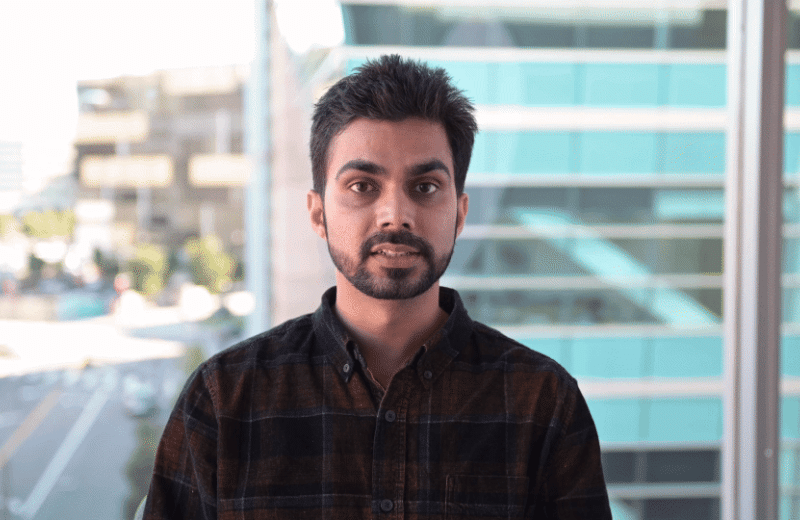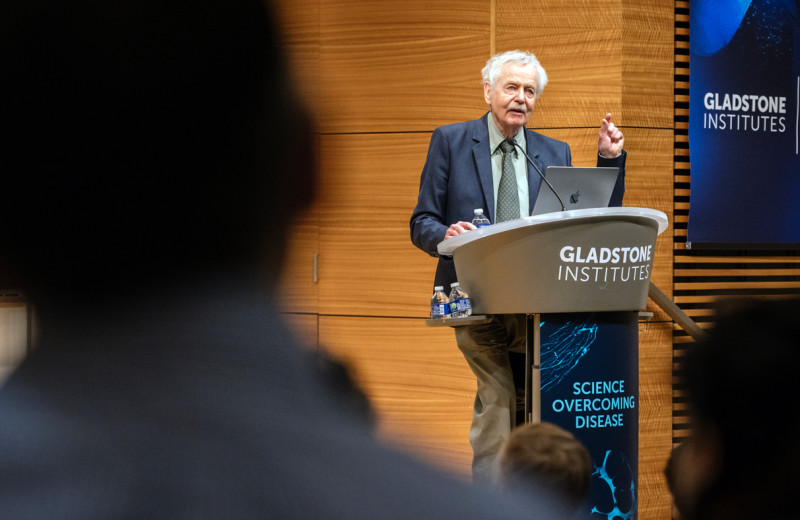Gladstone NOW: The Campaign Join Us on the Journey✕

Anand Pai, PhD, is a postdoctoral scholar in the laboratory of Leor Weinberger, PhD. He joined the Gladstone Institutes in 2013 after earning his doctorate in biomedical engineering from Duke University.
What brought you to Gladstone?
My graduate work was largely in quantitative biology involving mathematical modeling, synthetic gene circuits, and quantitative time-lapse microscopy. I used all of these approaches to study bacterial social behavior—how bacteria communicate and cooperate as a population. Then, toward the end of my graduate work, I completed a fellowship in which I shadowed clinicians in infectious diseases at Duke University Medical Clinic. That was a great experience. I got to see first hand what goes on in clinics, and that really turned me on to working directly on a disease issue.
So, for my postdoctoral work, I wanted to take the same tools I used in a viral system and apply them to a field with direct medical relevance. Leor’s lab at Gladstone was a great fit for me because he used and developed these tools to study HIV.
What do you like about Gladstone?
I like the work going on at Gladstone. Being here, I get to see and hear about a lot of fascinating discoveries, often before they hit the press. Day to day, I enjoy seeing what my colleagues are up to—the questions that they think of and decide to pursue. I enjoy being in a position that sees so many ideas move from conception to completion.
Why did you decide to go to graduate school?
After earning my bachelor’s degree in India, I worked as a research assistant in a national lab that took on contracted research projects. I liked doing the research on those projects. Graduate school was an obvious transition after that.
What do you do when you are not working in the lab?
It used to be mostly listening to jazz and eating the great cheap food around the city with my wife. Then my wonderful baby happened. Now it’s mostly playing with her and whatever I can do while walking around with her strapped to me.
I also enjoy reading fiction. Some of my favorite authors include Gabriel García Márquez, Toni Morisson, Hilary Mantel, Jhumpa Lahiri, and Julian Barnes.
If you could learn to do anything, what would it be?
When I grow up, I will learn to play the saxophone.
What is your hidden/unique talent?
I have no real talent worth writing about, unless watching criterion collection movies and analyzing how distraught they make you feel is a talent.
Name one thing that not many people know about you.
I don’t quite like answering the question, “How’s it going?” unless the person asking is prepared to listen to my long, rather detailed answer.
If you could meet any scientist from any point in time, who would it be and why?
I don’t think I would like to meet scientists, per se, unless that includes David Attenborough, a naturalist well-known for his BBC television personality. But to see any person at any point in time? I would’ve liked to see Miles Davis, John Coltrane, or Thelonious Monk perform.
Want to Join the Team?
Our people are our most important asset. We offer a wide array of career opportunities both in our administrative offices and in our labs.
Explore CareersMeet Gladstone: Shyam Jinagal
Meet Gladstone: Shyam Jinagal
Shyam Jinagal explores how genetics, aging, and regeneration shape the heart—and how those insights could one day restore heart function after injury.
Graduate Students and Postdocs Profile Cardiovascular Disease Srivastava LabA Sculptor of Modern Regenerative Medicine
A Sculptor of Modern Regenerative Medicine
Among his myriad accomplishments, Rudolf Jaenisch—winner of the 2025 Ogawa-Yamanaka Stem Cell Prize—was the first to demonstrate the potential of induced pluripotent stem cells to treat disease.
Awards Ogawa Stem Cell Prize Profile Regenerative Medicine Stem Cells/iPSCsMeet Gladstone: Shijie Wang
Meet Gladstone: Shijie Wang
Shijie Wang, a postdoctoral scholar in Steve Finkbeiner’s lab, uses artificial intelligence, robotics, and stem cell technologies to uncover how brain cells die in neurodegenerative diseases like Alzheimer’s and Parkinson’s.
Profile Neurological Disease Finkbeiner Lab AI Robotic Microscopy



